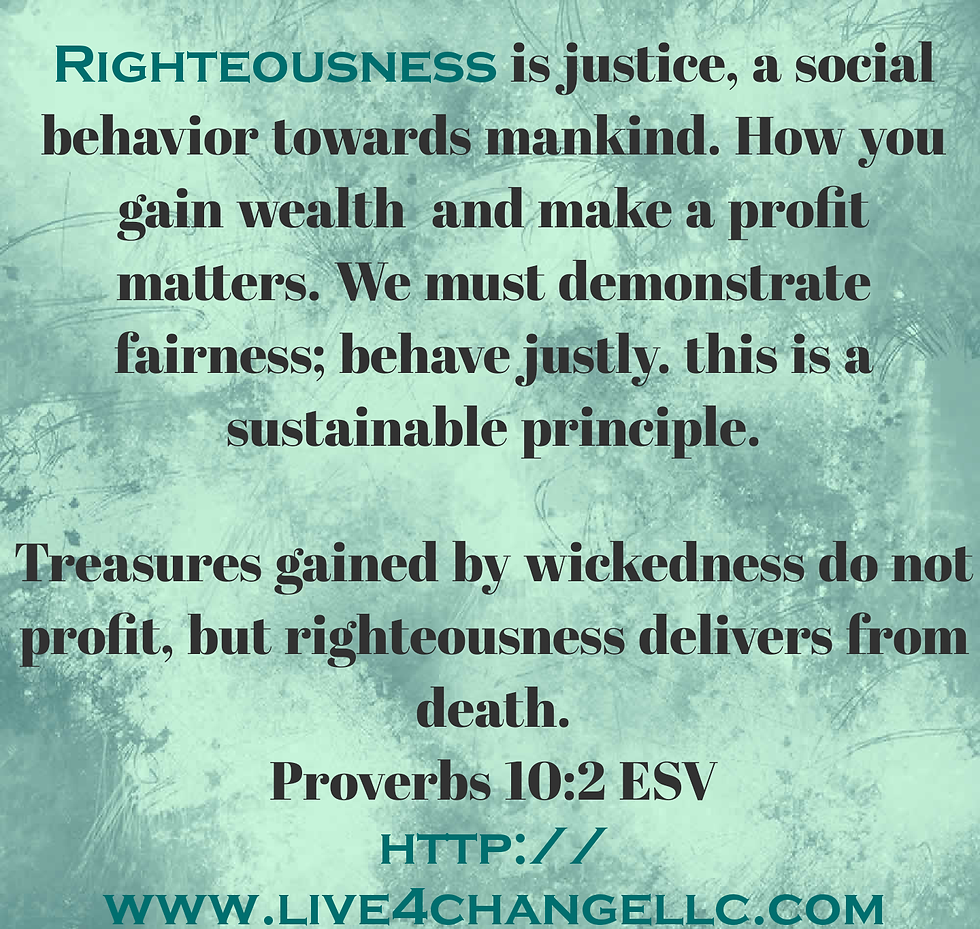S³- Sustainable Strategies Segment: Global Ethics- Doing What You Know is Right No Matter What!
- E. Michelle Mickens
- May 4, 2017
- 3 min read

What does ethics look like in your organization?
Is ethical behavior an exception or an expectation in your organization?
Do your employees understand the company’s code of ethics?
Is Corporate Social Responsibility (CSR) integrated into the fabric of how you do business?
Sustainability is no longer a part of a “green movement” nor is it only about taking care of the planet. Being sustainable is a behavior that is integrated into the culture of an organization. It’s about how an organization care for its employees. It’s about being profitable, but also about how profits are generated and is the organization’s purpose part of the impetus behind the profits.Sustainability is about reflecting the attitudes, and ethical behaviors that exemplify what the organization truly stands for and why.
Sustainable, transformational leaders drive CSR strategies and ethics in their organizations. CSR and ethics are often woven together and are esteemed as a high priority. According to the 2016 UN Global Compact survey of over 1,000 CEOs in 100 countries and over 25 industries, 89% of the CEOs agreed that sustainability practices have significantly impacted their industry and this number is rapidly increasing. Your clients, customers, stakeholders, and investors expect transparency and accountability.
Too often, in an effort to be competitive and build brand recognition, the integrity of the organization suffers. Unfortunately, a common reoccurring scene is corporate growth that breeds unwarranted consequences because of the unethical behaviors of a few in leadership. We’ve seen this happen in industries such as the finance and housing market’s downfall which imploded businesses and reverberated throughout communities; destroying economies both nationally and globally. Multinational corporations’ catastrophes such as The Deepwater Horizon BP oil spill of 2010, adversely impacted ecosystems, economic systems, and the livelihood of businesses and coastal communities in ways that can never be restored.[1] The Monsanto Company is another example of global corporate controversy and questionable ethical behaviors that are justified under the guise of meeting sustainability obligations. Their record is marred and their benevolent efforts are tainted through the highly debated harm their products cause to people’s health and small farming businesses. The mass production of GMO (genetically modified organisms) and GMP (genetically modified products) raises ethical concerns about the impacts of these innovative processes that have infiltrated the world. The producer of Agent Orange has now taken on the mission to feed the world in an attempt to address the forecast of global food shortages due to climate change, scarcity of water, and other limitations of natural resources.[2] The means do not justify the end!
Action Steps
To support deliberate ethicality and social responsibility in organizations, here are a few recommendations:
Identify a CSR initiative that aligns with the purpose and strategic intent of the organization.
Define how CSR support the ethical conduct and responsibilities of the organization.
No tolerance for unethical behavior. Personnel handbooks and other pertinent materials should spell out the consequences of these behaviors.
Rewards for demonstrating consistent ethical behavior should be tied to performance reviews and performance should be tied to key CSR indicators.

Conclusion
No longer should CSR be viewed as a separate entity from a corporation’s ethical position. The authenticity of a leader is defined by how she or he behaves. It’s easy to make good decisions and treat others well when there is no pressure. But it’s the pressure that squeezes the nature, the essence of who you really are. Nothing destroys good efforts as quickly as bad behavior exposed. In the midst of a crisis and constant change, a leader’s spirit can be at peace knowing she or he had been a good steward of the people, the planet and the profits that have been entrusted into his or her care by God.
If you would like to read the full paper on global ethics and CSR download a free copy:
Follow me: E. Michelle Mickens, Please share your thoughts about this topic. I'd love to hear from you!
email: e.michellemickens@live4changellc.com
Website: www.live4changellc.com and on:
References:
[1] Committee on the Effects of the Deepwater Horizon Mississippi Canyon-252 Oil Spill on Ecosystem Services in the Gulf of, M., Ocean Studies, B., Division on Earth and Life, S., & National Research, C. (2013). An Ecosystem Services Approach to Assessing the Impacts of the Deepwater Horizon Oil Spill in the Gulf of Mexico. Washington, D.C.: National Academies Press.
[2] Kowitt, B. (2016). Can Monsanto Save The Planet? Fortune, 173(8), 94-104.










































Comments